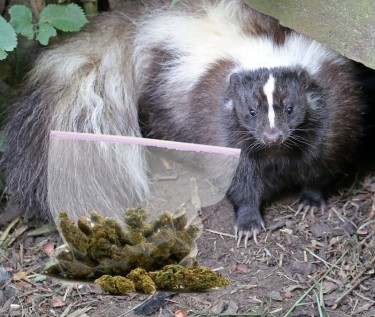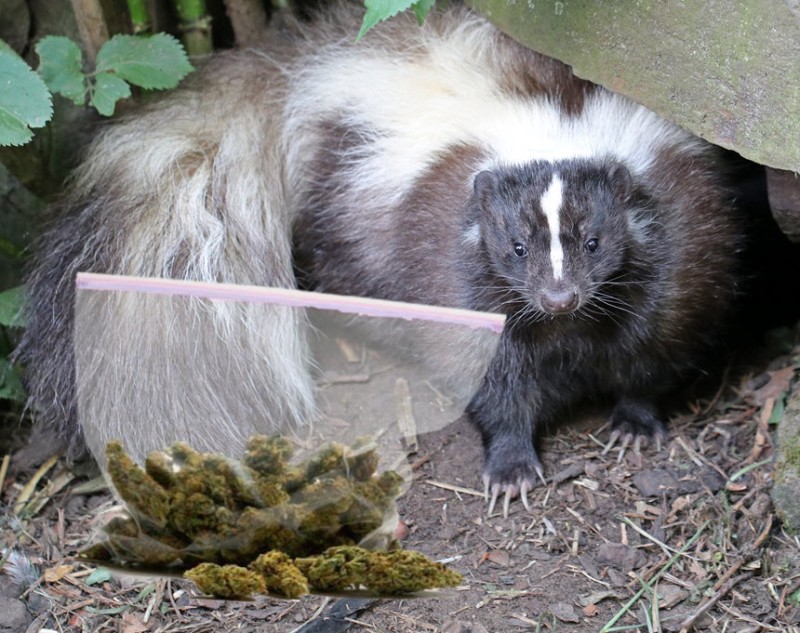
The pungent odor of skunky weed is truly distinct: you can smell it from far away when in the outdoors, and while indoors, it can linger for far longer than we’d like.
The unique smells that cannabis has is one of the many things that’s so special about it. With over 200 terpenes, or the aromatic compounds found in all plants (not just cannabis) available in marijuana, scientists have only begun discovering in recent years that these compounds don’t just play a role in how cannabis smells but also its medicinal properties.
However, the skunk variety, has left many researchers in the dark until recently.
A new study conducted by researchers in Abstrax Tech in California, published on November 12th, 2021 in the ACS Omega journal, revealed that the notoriously pungent smell of skunky cannabis share molecular structure similarities as those in garlic – and the actual skunk! Garlic is an herb famous for its tremendous benefits particularly when it comes to inflammation, cancer, bacteria, and viruses. They also discovered new compounds, called “prenylated volatile sulfur compounds (VSCs)” which are also found in the aerosol defensive sprays of skunks.
“These compounds in garlic are some of the most important regarding this plant’s health benefits in our diets,” explains Iain Oswald, lead author of the study and a principal research scientist at California-based cannabis research firm, Abstrax. “They contribute toward garlic’s positive cardiovascular properties; as well some have been shown to possess certain anti-carcinogenic properties in vitro,” he told McClatchy News. They found that the VSC’s tend to be significantly more concentrated in the cannabis plant when it reaches the flowering stage and will also reach its peak stage during curing. Afterwards, the levels of VSCs will drop after the plant has been stored for 10 days, they observed when doing a greenhouse experiment.
“We specifically focused on identifying VSCs for two reasons: First, the aroma of cannabis is often described as ‘skunk-like’, and skunks are well known to possess several potent VSCs in their defensive aerosol spray, we suspected there could be similar compounds in cannabis. Secondly, VSCs are also important in the chemistry of other plants known for their oftentimes pungent aromas and flavors, including hops (Humulus lupulus), garlic (Allium sativum), and durian (Durio zibethinus),” they wrote.
The very unique flavor and aroma of garlic is attributed to various types of VSCs particularly triallyl disulfide and diallyl disulfide, which are quite similar to the VSCs that were identified in cannabis.
The researchers also did a chemical analysis on 3 cannabis concentrate extracts and discovered that it contains high concentrations of specific compounds, proving that cannabis extracts can also have the skunky aroma. And because of garlic’s well-known health benefits, the authors think that these VSCs in cannabis can also have some special benefits for our health, though this requires more study.
“Furthermore, identification of the reported VSCs definitively confirms the chemical origins of the odor of cannabis and provides a new family of secondary metabolites that can be investigated regarding their biosynthetic pathways and medicinal benefits,” they conclude.
Increasing Interest In The World Of Cannabis Terpenes
Today, we know that terpenes do far more than just contribute to the unique scents of cannabis.
In the plant world, there have been some 20,000 terpenes that have already been identified, which can also cause a wide range of effects on the human body. They can vary from stress reduction, fight inflammation, reduce pain, improve focus, and even cause hallucinations. A few decades ago, the focus of cannabis research was primarily for cannabinoids, the dominant active compounds in the plant specifically THC and CBD. However, when isolated versions of these compounds were given to patients, researchers found that it didn’t have the same health benefits as when patients were given whole plant medicine.
Many studies of THC and CBD revealed that these cannabinoids didn’t work as effectively alone, as compared to when they were given together with other compounds. This led scientists to conclude that there were far many other compounds within the plant that enhanced its therapeutic effects, including terpenes, which became known today as the entourage effect. It’s also interesting that aromatherapy practitioners were the ones who were previously dedicated to studying terpenes, though there are only few and far in between quality studies into the cannabis terpenes. It’s good to note that they are growing, as commercial and private interest in the potentials of cannabis terpenes are blowing up and it’s no secret.
Another interesting discovery about terpenes is that they can help cannabinoids get absorbed by the bloodstream much quicker. For example, linalool has been shown to adjust how neurotransmitters react to THC and CBD, resulting in anti-anxiety and relaxing effects. In addition, CBD together with certain terpenes work together to reduce long term memory loss which is a common side effect of THC, while diminishing the psychoactive effects of the cannabinoid too. These are just some of the many wonderful ways that terpenes work together with cannabinoids to produce desirable outcomes through the entourage effect.
What we know about terpenes today is merely the tip of the iceberg. A year from now, we’ll likely find out even more exciting breakthroughs about these amazing aromatic compounds in the cannabis plant, and how they can help us.






